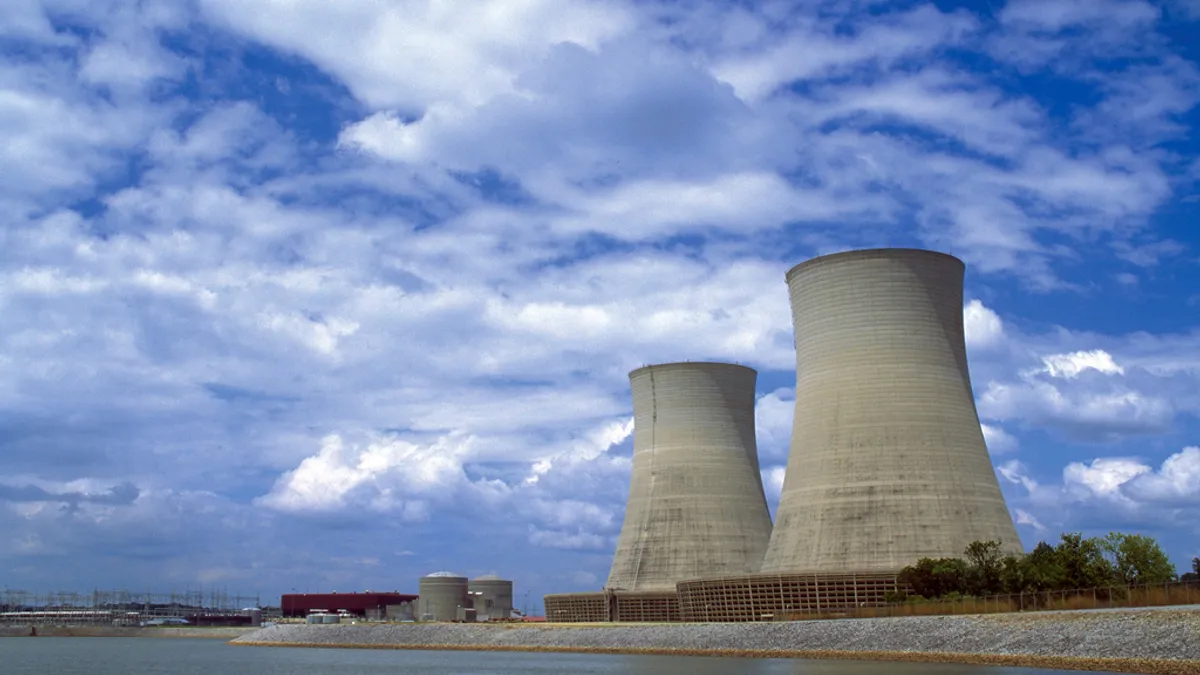Dive Brief:
- House members on Tuesday introduced bipartisan legislation to encourage further development of advanced nuclear energy programs.
- Key parts of the bill include developing at least two advanced nuclear reactor demonstration projects by Dec. 31, 2025; creating a nationwide strategy for nuclear science and engineering research and development; and revising federal contracting regulations.
- The bill extends the maximum length of federal power purchase agreements (PPAs) from 10 to 40 years and requires the federal government to enter into at least one such agreement by Dec. 31, 2022, with a commercial nuclear reactor that receives a license from the Nuclear Regulatory Commission after Jan. 1, 2019.
Dive Insight:
Recent state legislative battles over nuclear energy incentives, as well as the closure of a number of nuclear power plants across the country are indicators of the economic challenges the resource faces in the United States.
Last month, Exelon Generation announced it will shut down unit 1 of the Three Mile Island (TMI) nuclear power plant by Sept. 30, after a roughly $500 million bailout bill stalled in the Pennsylvania legislature. TMI’s Unit 2 has been offline since 1979 after a partial nuclear meltdown damaged the reactor’s core.
The Nuclear Energy Leadership Act aims to reverse this downward trend by promoting advanced nuclear energy through research and development initiatives and regulatory changes, including revising federal contracting regulations that would allow the government to enter into PPAs for up to 40 years.
"Nuclear energy is at a disadvantage when competing for...PPAs due to a law that pre-dates commercial nuclear power and limits PPAs to 10 years," a Senate Energy Committee analysis of a companion Senate bill, S.903, said. "Initial capital costs for nuclear reactors are paid for over a period beyond ten years, which means 10-year PPAs do not work for nuclear projects," the analysis continued.
Both bills establish a pilot program whereby the federal government can partner with industry as an adapter of new technologies and enter into a nuclear power purchase agreement longer than 10 years. The bill aims for at least one such PPA by 2024, with newly approved reactors that "can provide reliable and resilient power."
"As an engineer who operated nuclear reactors on aircraft carriers, I know that ensuring a thriving civilian nuclear industry is vital not only for our economy, but for our national security," Rep. Elaine Luria, D-Va., a co-sponsor of the bill, said in a statement.
Luria also highlighted nuclear power's potential in the energy sector’s transition toward carbon-free generation. Citing a 2018 MIT study, Luria said that 55% of carbon-free energy in the United States comes from nuclear energy.
"This legislation will help advance the development of clean, nuclear energy and makes the necessary investments in the students pursuing jobs in the field," Rep. Rob Wittman, R-Va., said in a statement.
Rich Powell, executive director at ClearPath Action, praised the House for introducing the bill.
The Nuclear Energy Leadership Act "is a broad and bold step toward developing the federal goals and public-private partnerships necessary to cross the valley of death that often stops groundbreaking nuclear innovation from winning in the marketplace," Powell said in a statement to Utility Dive.
But not everyone believes that nuclear energy should be part of America’s energy future. Advocacy group Public Citizen said nuclear energy has been overtaken by wind and solar for the future of zero-emission power.
"Forcing ratepayers into a long-term power purchase agreement for new reactors is a misallocation of funds that would be better spent on energy efficiency, renewable energy and electric transit infrastructure," Tyson Slocum, director of Public Citizen’s energy program, told Utility Dive. "Nuclear power is simply too expensive and too risky to serve in the energy mix in the years to come."
The companion Senate bill is also bipartisan and was introduced in March with a total of 13 co-sponsors, led by Alaska's Lisa Murkowski, R, and New Jersey's Cory Booker, D.














